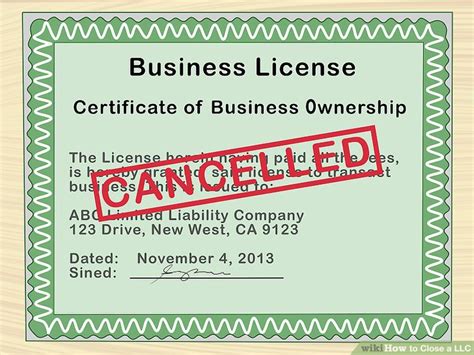How to Close an LLC: A Step-by-Step Guide
Closing a Limited Liability Company (LLC) might seem daunting, but with a systematic approach, it can be a straightforward process. This guide will walk you through the essential steps, ensuring you comply with all legal requirements and avoid future liabilities. Remember, state regulations vary, so always check your specific state's guidelines.
Understanding the Dissolution Process
Before diving into the specifics, it's crucial to understand what "dissolution" means in the context of an LLC. Dissolution is the formal process of terminating your LLC's legal existence. This isn't simply ceasing operations; it's a legally mandated procedure to ensure all debts are settled and the LLC's affairs are wound up correctly. Failing to properly dissolve your LLC can lead to continued liability for you personally, even after you've ceased business activities.
Step-by-Step Guide to Closing Your LLC
This guide provides a general overview. Always consult with legal and financial professionals to ensure you meet all state-specific requirements and protect your personal assets.
1. Review Your LLC's Operating Agreement:
Your operating agreement should outline the process for dissolving the LLC. This document is paramount; it details the procedures for distributing assets and handling outstanding liabilities. Familiarize yourself with its contents before proceeding.
2. Notify Members and Creditors:
Inform all members of the LLC of your intent to dissolve. This is often legally mandated. Additionally, notify all known creditors of the impending closure. This allows them to file any outstanding claims against the LLC before its assets are distributed.
3. Wind Up the LLC's Affairs:
This crucial step involves:
- Paying off all debts and obligations: This includes settling accounts payable, taxes, and any other outstanding financial commitments. Failure to do so can result in personal liability for members.
- Collecting outstanding receivables: Attempt to collect any money owed to the LLC.
- Selling assets: Liquidate any remaining assets of the LLC, such as equipment, inventory, or real estate. This will provide funds to satisfy outstanding debts.
- Filing the necessary tax returns: Ensure all required tax returns are filed accurately and on time, including any final tax returns for the LLC.
4. Distribute Remaining Assets:
Once all debts are settled, distribute the remaining assets to the members according to the operating agreement or state law. This usually follows the percentage ownership outlined in the LLC's formation documents.
5. File Articles of Dissolution (or equivalent):
This is the official legal step to dissolve your LLC. The specific name and process vary by state. You'll likely need to file a Certificate of Dissolution or Articles of Dissolution with your state's Secretary of State or equivalent agency. This document formally declares the LLC's dissolution. This often involves paying a filing fee.
6. Comply with Post-Dissolution Requirements:
Even after filing the dissolution paperwork, certain post-dissolution requirements must be met:
- Maintaining records: Retain all relevant financial and legal documents for a specified period, as required by your state.
- Responding to potential claims: Remain aware of any potential outstanding claims against the LLC, even after dissolution.
- Paying any remaining taxes: Ensure all outstanding tax liabilities are addressed.
Common Mistakes to Avoid
- Ignoring the Operating Agreement: Failure to follow the instructions within your operating agreement can lead to legal disputes and complications.
- Failing to Notify Creditors: Overlooking this step can leave you personally liable for the LLC's debts.
- Not Filing the Necessary Paperwork: Improperly filing dissolution documents can result in continued legal existence of the LLC and ongoing liability.
Seeking Professional Advice
This guide provides a general framework. The specifics of dissolving an LLC vary significantly by state. Consulting with an attorney and a tax professional is strongly recommended to ensure compliance with all legal and financial requirements specific to your location and circumstances. They can offer personalized guidance to navigate the complexities of LLC dissolution and protect your interests.
